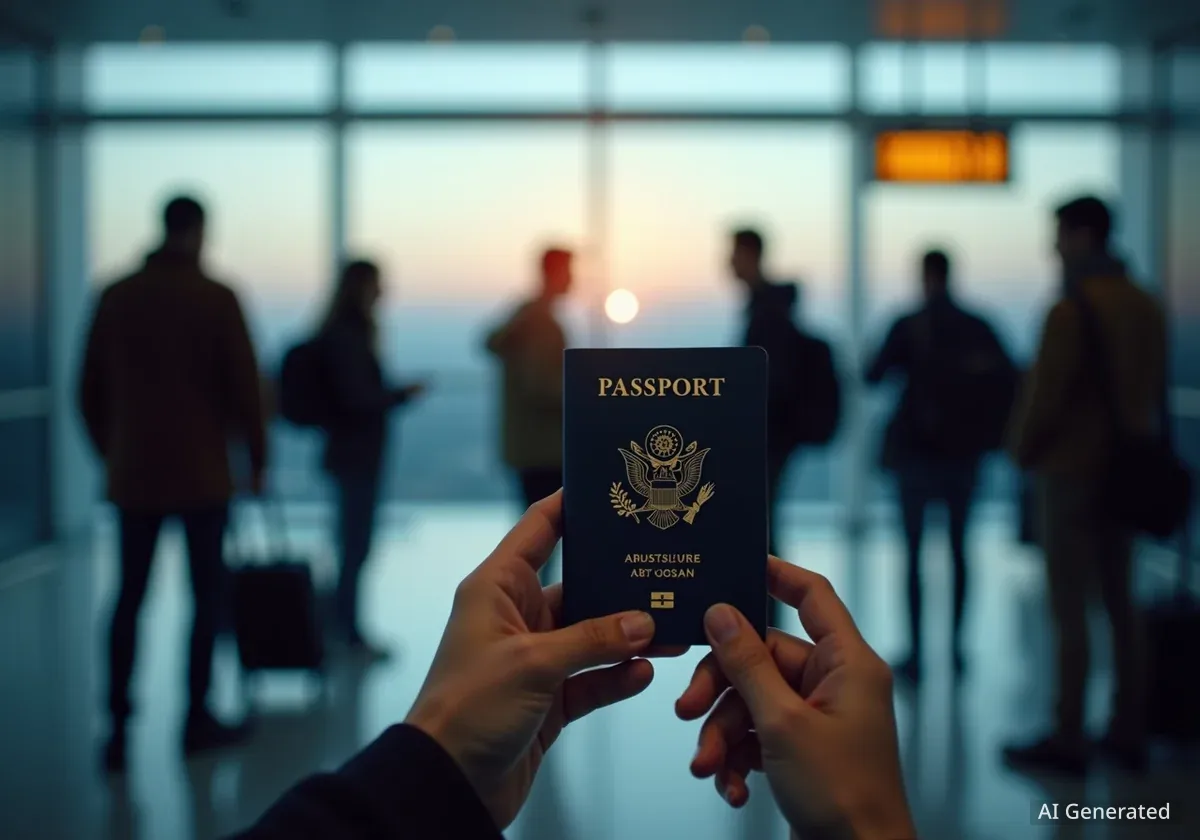British passengers traveling to the European Union via Eurostar will soon undergo new border control procedures. These changes, part of the EU's Entry-Exit System (EES), will require travelers to provide biometric data and answer specific questions about their trip. The 'soft launch' of this system begins on October 12, initially affecting only business and premium class passengers, before expanding to all standard class travelers in January.
Key Takeaways
- New EU EES border checks begin October 12 for British Eurostar passengers.
- Passengers must provide biometrics (face scan, fingerprints) and answer four questions.
- The process is expected to add 10 minutes to check-in time at St Pancras.
- Standard class passengers will be affected from January 12, 2025.
- Eurostar and St Pancras have invested £10 million in infrastructure.
New Border System Implementation Details
The new Entry-Exit System (EES) is designed to enhance cross-border security for the Schengen area. For UK passport holders, this means a more detailed check-in process when traveling to EU countries. The system requires travelers to register biometric information, including a face scan and fingerprints, along with answering a set of questions about their journey.
The initial phase, starting October 12, will involve a limited number of travelers. Eurostar has confirmed that only those holding business and premium class tickets will participate during the first three months. This allows for a controlled rollout and the resolution of any initial technical issues.
System Costs and Infrastructure
Eurostar and London St Pancras High Speed, the owner of St Pancras station and the HS1 train line, have jointly invested approximately £10 million to adapt the station for the new EES system. This investment covers the installation of new kiosks and other necessary infrastructure.
Impact on Passenger Check-in Times
The introduction of the EES is expected to extend the check-in process for Eurostar passengers by about 10 minutes. This means travelers should plan to arrive at St Pancras station 75 minutes before their train's scheduled departure time, an increase from previous recommendations. This adjustment is necessary to accommodate the additional steps required by the new border controls.
Simon Lejeune, head of safety and stations for Eurostar, discussed the phased approach to implementation. He stated,
"We are ready for the launch of EES. It’s going to be a phased approach, with a modest launch on October 12 followed by a bigger launch on January 12. It will be in full flow by April next year."
Kiosk Facilities at St Pancras
To facilitate the new procedures, 49 kiosks have been installed at St Pancras station. These kiosks are where UK passport holders will complete their face, fingerprint, and passport scans. The kiosks are distributed across three main areas within the station:
- Ground Floor Area 1: 35 kiosks located within the main Eurostar section.
- Ground Floor Area 2: Additional kiosks situated opposite the entrance to the Thameslink station.
- First Floor: A third 'overflow' area with 14 kiosks, available during peak times or for additional capacity.
Passengers will receive information about which kiosk area to use 30 days in advance of their travel date. This information will be provided through the Eurostar app and with their train ticket details. This advance notice aims to help manage passenger flow and reduce potential confusion.
Who is Affected?
The EES system applies only to citizens of countries outside the EU, such as the United Kingdom following Brexit. Travelers from EU member states and associated countries like Switzerland and Norway are not subject to these new checks.
Key Questions for Travelers
Under the Schengen area rules, French border authorities will require British travelers to answer four specific questions. These questions are designed to assess the traveler's intent and preparedness for their stay in the EU. Initially, there was a translation error on one of the questions, which Eurostar has since confirmed will be corrected.
The four questions are:
- Do you have somewhere to stay?
- Do you have a return ticket?
- Do you have sufficient funds to support yourself during your stay (e.g., credit card, cash)?
- Do you have travel insurance? (Initially translated as 'medical insurance', this has been amended to 'travel insurance'.)
Passengers who answer "no" to any of these questions will not be able to use the e-ticket gates. Instead, they will need to speak directly with a French border control officer. This could lead to further delays in their journey. However, it appears that travelers might be able to bypass immediate restrictions by answering "yes" to all questions, even if not entirely accurate, though they could still be questioned by a border guard.
Phased Rollout and Future Plans
The EES system is scheduled to become fully operational by April 12, 2025. However, the launch period could be extended by an additional 90 days if significant issues arise during the initial phases. This flexibility aims to ensure a smooth transition and minimize disruption for travelers.
Richard Thorp, chief operating officer at London St Pancras High Speed, mentioned that extra staff would be available to assist passengers who encounter difficulties with the kiosks. The goal is to prevent the questions from causing undue concern or fear among travelers regarding border regulations.
It is important to note that the information provided to Eurostar will not be cross-referenced with the answers given by passengers at the kiosks. This suggests a focus on the immediate border control process rather than a comprehensive data comparison.
Differences at Other Locations
The specific questioning process will not apply to passengers traveling via Le Shuttle at Folkestone. This is because Folkestone currently lacks e-gates, and all travelers undergo face-to-face document checks with border officials. This human interaction negates the need for the automated kiosk questions.
For other Eurostar stations, such as Gare du Nord in Paris, 17 kiosks will be installed. However, stations in Amsterdam, Brussels, and Lille will not have dedicated EES kiosks. In these locations, UK citizens will complete the biometric and questioning procedures as part of their standard border checks.
During the introductory phase, the system allows for "fire breaks." These temporary pauses can be implemented to alleviate overcrowding caused by other delays. Mr. Lejeune confirmed this flexibility, stating,
"In the worst circumstances, we can take it off altogether."This option provides a safeguard against severe travel disruptions during the implementation period.





